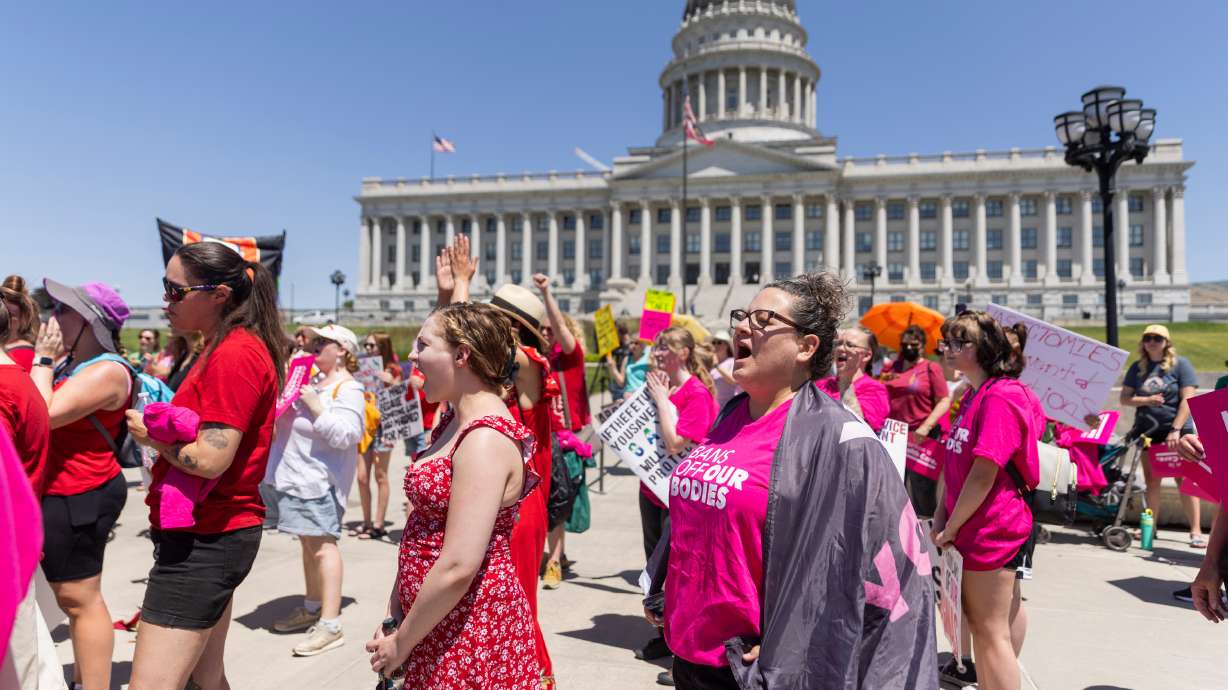Estimated read time: 3-4 minutes
This archived news story is available only for your personal, non-commercial use. Information in the story may be outdated or superseded by additional information. Reading or replaying the story in its archived form does not constitute a republication of the story.
SALT LAKE CITY — On the two-year anniversary of the U.S. Supreme Court's decision to overturn Roe v. Wade, over 100 Utahns gathered in front of the state Capitol to join a nationwide protest of the decision and let their voices be heard.
The message being touted by protesters was clear: Abortion is health care and any bans on it are a direct attack against women's rights.
Mindy Storey was there with her daughters Oaklee Nickell and Emmalee Butler to "fight for my girls and their right to reproductive health care," she said.
"I'm just here to support women. I think it's ridiculous that we're moving backwards in time and reversing and going back on things that were already in place, so I'm here to stand up for that," said Nickell.
Currently, 41 states have some form of abortion ban in place, with 14 states having a total abortion ban, and 27 states having abortion bans based on gestational duration.
On the same day that the Supreme Court overturned Roe v. Wade — revoking the constitutional right to an abortion that had been in place for nearly 50 years — Utah's abortion prohibition bill or "trigger law," which passed in 2020, was also activated.
The bill would ban abortions at any stage of pregnancy except in certain instances, including cases of rape or incest, if the mother's health is seriously at risk, or if two maternal-fetal medicine physicians agree the fetus has a lethal birth defect or a severe brain abnormality.
Shortly after the Supreme Court's decision to overturn Roe v. Wade, a Utah state court issued a preliminary injunction to prevent the state from enforcing its trigger law.
Lawmakers in 2023 tried to get around the hold by passing a law to effectively close all abortion clinics and require abortions be performed in hospitals, but that law was also paused by a judge after the Planned Parenthood Association of Utah added the new law to its preexisting lawsuit.
In August 2023, the Utah Supreme Court heard arguments in the lawsuit challenging the state's near-total abortion ban, but there is still no clear timeline for when the justices will decide whether to continue the injunction in the trigger law case.
Glenn Wright, a Democrat who is running to replace John Curtis as the U.S. House representative for Utah's 3rd Congressional District, was also on hand for Monday's demonstration.
"Families are concerned about Utah's trigger law that denies personal agency and could force women to travel to other states to obtain life-saving health care and ensure that they can preserve their future reproductive health," Wright said. "The majority of women do not consent to this."

He criticized local Republican candidates who identify as being pro-life, instead saying he considers that stance as being "strongly anti-freedom."
In January, around 1,200 people participated at the Utah Capitol in Pro-Life Utah's annual March for Life.
On Monday, before the abortion-rights group marched to Washington Park, a handful of speakers shared personal stories of how abortion access has saved their lives or the life of someone they know. The stories spurred raucous cheers and emotional cries as person after person took center stage to share deeply personal stories with the crowd.
"I'm here for the women that have fought for me before and I think it's important for the young generation to stand up for themselves and their future," Butler said. "They can't ban abortion completely but they can get rid of safe abortions. Either way, it's going to happen."

Storey took it a step further, saying the conversation is bigger than just the right to an abortion.
"This is about having health care that's accessible to women, regardless of age, race, whatever their circumstance is, this is bigger than just abortion. This is about protecting women's access to health care," Storey said.
Nickell added that women are "done being quiet" when it comes to their ability to access what they call reproductive health care.
"We're tired of other people making laws about our bodies," Nickell said.









